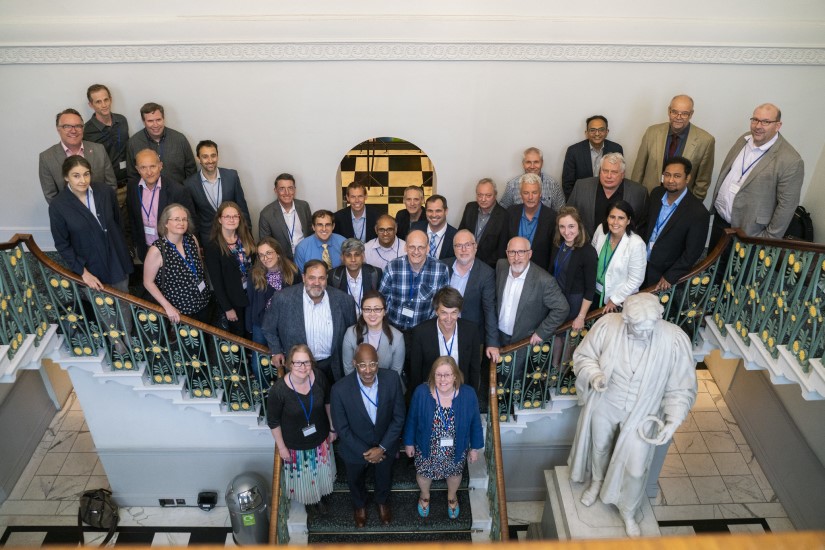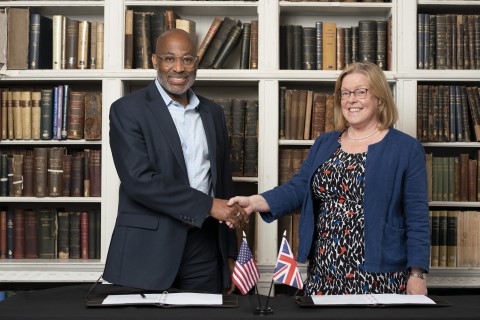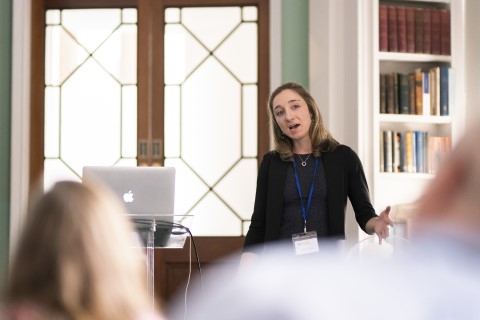International Collaboration Strengthens Sustainable Battery Research
Attendees of the United Kingdom’s Faraday Institution electrochemical energy storage
workshop explored collaboration opportunities to improve the sustainability of lithium-ion
batteries. Photo from Faraday Institution
Sustainability of energy materials is a global concern, and collaborative research across oceans can play a key role in improving the design and recyclability of lithium-ion batteries for future use in electric vehicles and grid applications.
Researchers from the National Renewable Energy Laboratory (NREL) and various Department of Energy (DOE) national laboratories recently participated in a collaborative electrochemical energy storage workshop hosted by the United Kingdom’s Faraday Institution with battery experts from across the United States and the U.K. This in-depth meeting helped identify areas of mutual interest in areas of key battery research, such as reducing reliance on critical materials in cathode materials and ensuring recyclability of batteries.

NREL's Peter Green and Faraday Institution CEO Pam Thomas shake hands after signing the MOU between the United States and the United Kingdom. Photo from Faraday Institution
At the event’s conclusion, leaders in energy storage research from both countries signed a memorandum of understanding (MOU) establishing a cooperative relationship in support of projects to develop and improve high-capacity batteries as well as new methods for battery materials recycling. The MOU was signed at the Royal Institution—during the first in a series of U.S./U.K. workshops on electrochemical energy storage—by Pam Thomas, CEO of the Faraday Institution in the U.K., and Peter F. Green, deputy laboratory director for Science and Technology and chief research officer at NREL.
“The depth and breadth of scientific knowledge across the U.S. national labs and the U.K.’s world-leading universities is what allows for this kind of innovative partnership,” Thomas said. “By strengthening the connections amongst the best battery research groups in the U.S. and the U.K., we will accelerate discovery and much-needed breakthroughs in high-capacity cathode materials and develop recycling routes for lithium-ion batteries.”
NREL Researchers Share Opportunities in Electrochemical Energy Storage

NREL researcher Kae Fink presents on lithium-ion battery recycling at the workshop held at the Royal Institution. Photo from Faraday Institution
This MOU was signed during a two-day battery workshop hosted by the Faraday Institution, an independent institute for electrochemical energy storage research, skills development, market analysis, and early-stage commercialization in the U.K. Leading researchers from across DOE provided expert perspectives on issues facing electrification initiatives, including low-cobalt cathode development and recycling opportunities for lithium-ion batteries. NREL energy storage researchers played a key role in organizing the event, along with leading and moderating key discussions to identify potential areas of collaboration.
“An important goal is to establish a sustainable supply chain for critical materials, such as cobalt, and to establish a lithium battery recycling ecosystem to recover and reintroduce these materials into the battery supply chain. Electrochemical energy storage is one of DOE’s priorities, and collaborative activities have been established between the national laboratories in this area,” Green said. “This MOU leverages the enormous and historic strengths of the research enterprise in energy storage in both the U.S. and the U.K. to accomplish this.”
In addition to this workshop, NREL researchers met with long-time partners at University College London, Imperial College London, and the University of Warwick and visited the U.K. Battery Industrialisation Centre in Coventry. These meetings helped strengthen ongoing collaborative research in battery design and modeling.
The strength of these international partnerships will propel NREL’s battery research to new heights by providing opportunities for shared knowledge and collaboration on early-stage research and innovative problem solving. This MOU will encourage ongoing discussion and future workshops to advance research in electrochemical energy storage.
Learn more about NREL’s sustainable transportation and energy storage research. And sign up for NREL’s quarterly transportation and mobility research newsletter, Sustainable Mobility Matters, to stay current on the latest news.

